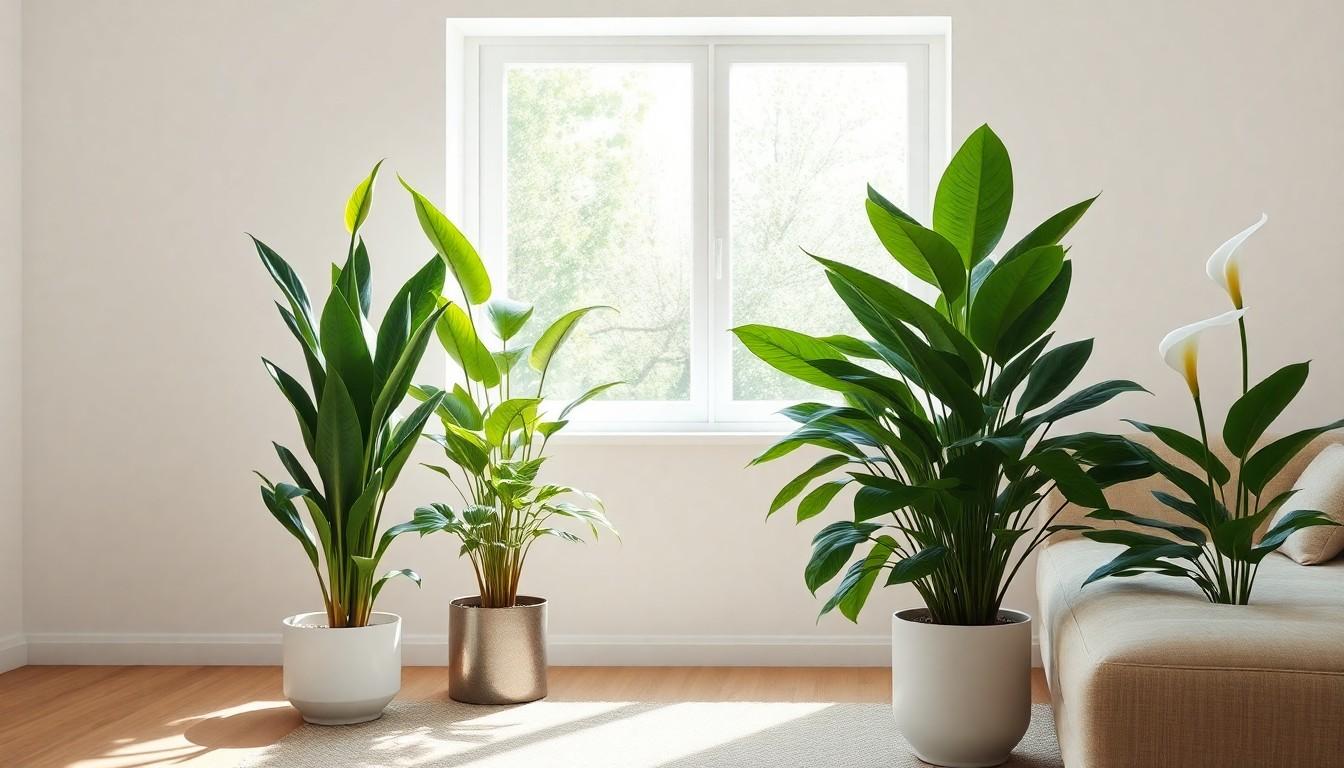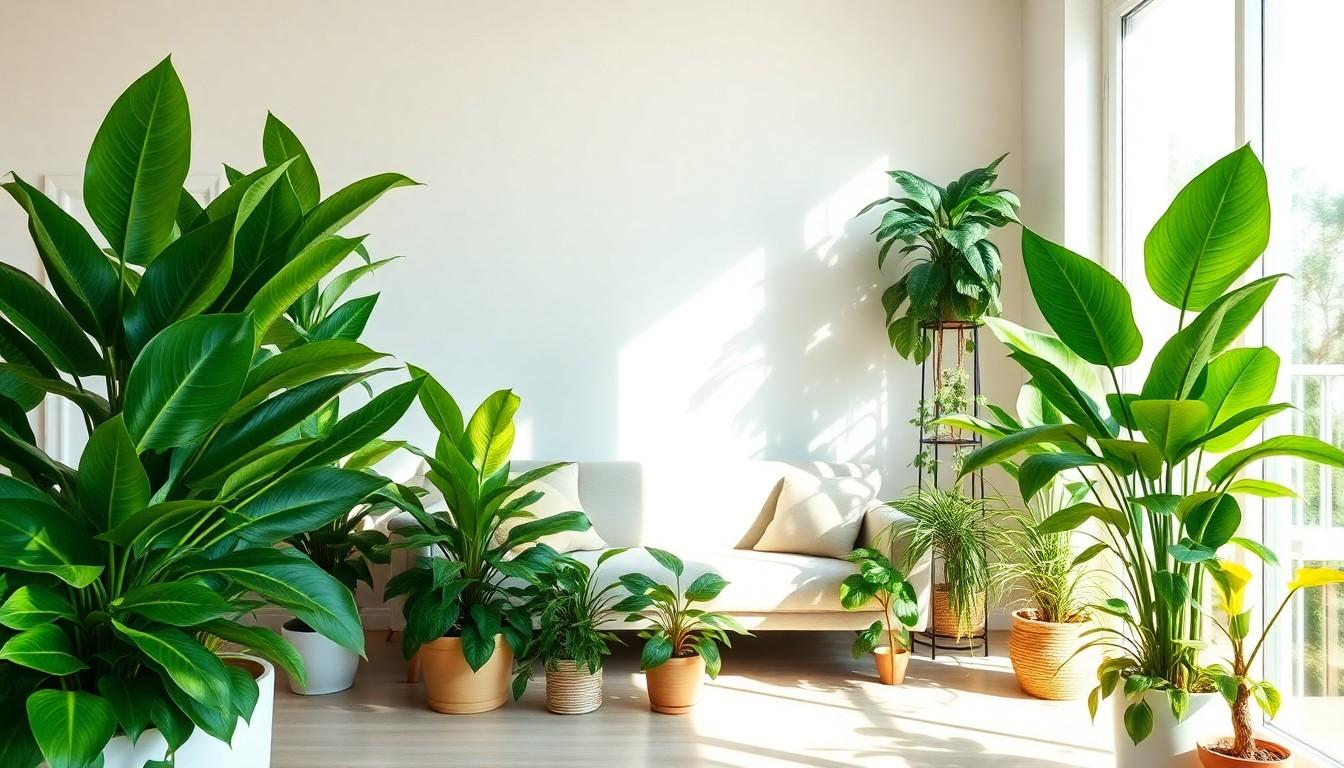Breathing easy at home shouldn’t feel like a luxury, but with indoor air pollution on the rise, it often does. Enter houseplants—the unsung heroes of clean air. These leafy companions not only brighten up a room but also work tirelessly to filter out toxins and improve air quality. Who knew that a bit of greenery could be your ticket to fresher air and a happier home?
Best Houseplants for Air Quality
Certain houseplants excel at improving indoor air quality. Spider plants serve as natural air filters, removing toxins like formaldehyde and xylene. Snake plants thrive on neglect, absorbing carbon dioxide at night and releasing oxygen, which enhances air freshness.
Peace lilies add elegance and perform well in low-light conditions. They efficiently filter out ammonia, benzene, and other harmful chemicals. Boston ferns increase humidity and purify air by absorbing pollutants, making them perfect for bathrooms or kitchens.
Rubber plants, with their glossy leaves, contribute significantly to toxin removal, focusing on formaldehyde. Pothos are easy to care for and tackle indoor air toxins, improving overall air quality.
Dracaenas come in various types, effectively removing substances like trichloroethylene and xylene from indoor air. They adapt well to different light conditions, allowing flexibility in placement.
Bamboo palms not only serve as beautiful decor but also filter toxins while adding a tropical feel to spaces. Ficus elastica, also known as the rubber tree, works well in filtering out toxins and requires minimal care.
These houseplants enhance aesthetics while actively contributing to a healthier living environment, making them essential for anyone looking to improve indoor air quality.
Top Picks for Improved Air Quality
Houseplants offer a simple yet effective way to enhance indoor air quality. Specific plants excel at filtering toxins and improving the environment.
Snake Plant
Snake plants thrive in low light and require minimal maintenance. This resilient plant absorbs carbon dioxide at night, converting it into oxygen during the day. Studies show it filters several harmful substances, including formaldehyde and benzene. Its striking upright leaves add a modern touch to any space. Place them in bedrooms or living areas to enjoy cleaner air and a stylish aesthetic.
Spider Plant
Spider plants are known for their air-purifying abilities and easy care. These adaptable plants excel at removing pollutants such as xylene and formaldehyde. They produce offshoots or “pups,” which can be propagated for new plants. Bright, indirect sunlight best supports their growth, making them suitable for different locations in the home. With their lush, arching leaves, they create a vibrant atmosphere while improving air quality.
Peace Lily
Peace lilies are renowned for their elegant blooms and impressive air-purifying qualities. They remove toxins like ammonia and benzene effectively. Preferring low-light conditions, they thrive with minimal care and add a touch of elegance to any room. Regular watering keeps their glossy leaves healthy and vibrant. Place them in corners or near furniture for a beautiful, detoxifying addition to living spaces.
Benefits of Houseplants
Houseplants offer numerous advantages for indoor environments, particularly in enhancing air quality and well-being.
Air Purification
Houseplants act as natural air purifiers, making even spaces like portable toilets feel fresher. They absorb pollutants such as formaldehyde, benzene, and ammonia, improving overall air quality. Spider plants and snake plants are particularly effective at filtering toxins, while peace lilies efficiently remove harmful particles from the air. Maintaining these plants contributes to a cleaner indoor atmosphere. Research from NASA shows that specific houseplants can reduce volatile organic compounds (VOCs) commonly found in homes. Each plant not only beautifies a space but also serves a functional purpose in promoting healthier air.
Psychological Benefits
Houseplants positively impact psychological well-being. Their presence can reduce stress, elevate mood, and enhance productivity. Studies highlight how indoor greenery lowers anxiety levels, encouraging a sense of calm. Exposure to plants has been associated with improved focus and cognitive function, making them ideal additions to workspaces. Adding greenery to living areas fosters a connection to nature, even in urban settings. In environments with houseplants, individuals often report increased feelings of happiness and overall well-being, promoting a healthier lifestyle.
Care Tips for Houseplants
Proper care ensures houseplants thrive while improving air quality. Understanding their specific needs enhances both plant health and indoor environments.
Light Requirements
Most houseplants thrive under indirect sunlight. Snake plants and pothos tolerate lower light levels, making them adaptable for various rooms. Peace lilies prefer bright, indirect light for optimal growth but can handle some shade. Spider plants flourish in bright conditions, although they can adjust to less light. Knowing each plant’s light preference encourages robust growth and better air-purifying abilities.
Watering Guidelines
Watering frequency varies by plant type. Spider plants generally require watering when the top inch of soil feels dry. Snake plants need less frequent watering, only when the soil is completely dry, as overwatering can lead to root rot. Peace lilies thrive with regular watering but should not sit in stagnant water. Always check the moisture level before watering to prevent over or underwatering. Consistent, appropriate watering contributes to healthy plants and effective air purification.
Integrating houseplants into living spaces offers a simple yet effective solution for improving indoor air quality. These natural purifiers not only filter harmful toxins but also contribute to a more inviting and serene environment. By selecting the right plants, individuals can enjoy cleaner air and the psychological benefits that come with greenery.
With minimal care and attention, houseplants like spider plants and peace lilies can thrive while enhancing overall well-being. Embracing these green companions can transform a home into a healthier sanctuary, making every breath taken a little easier and more refreshing.




